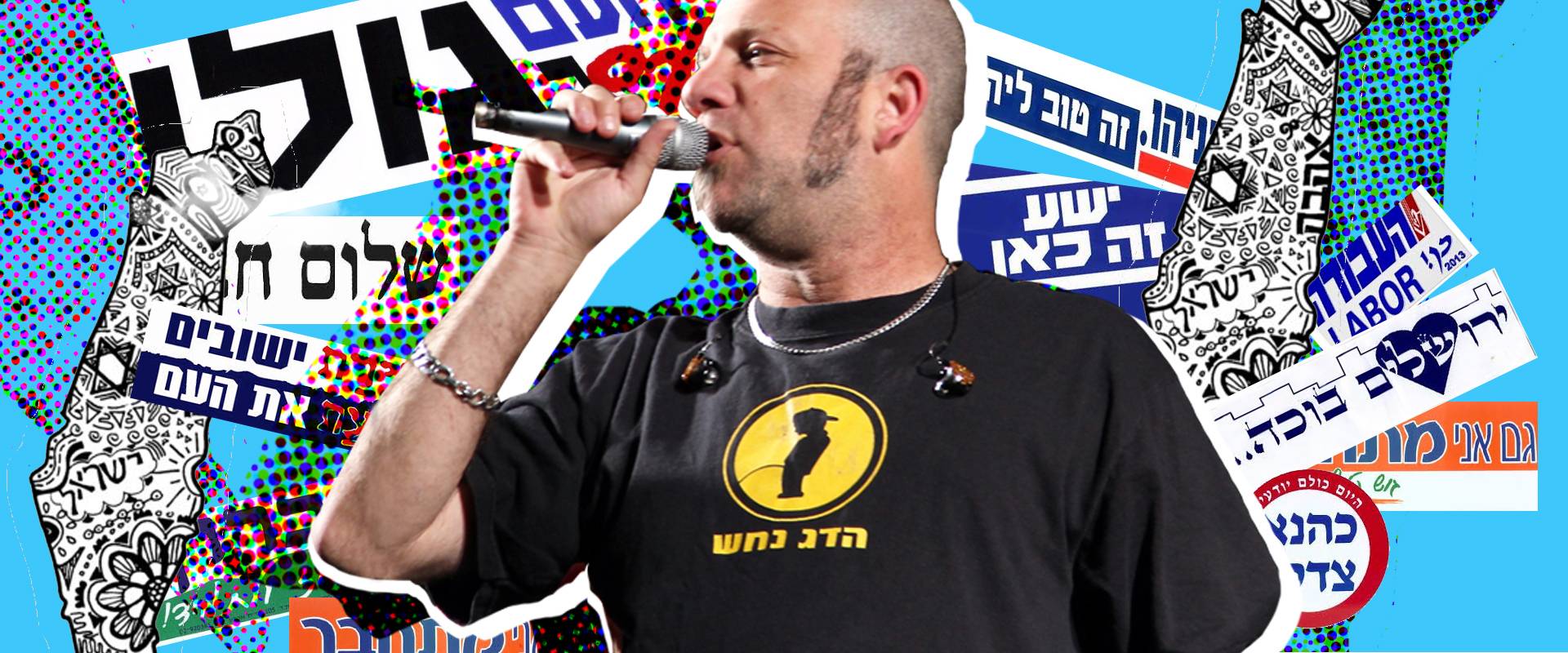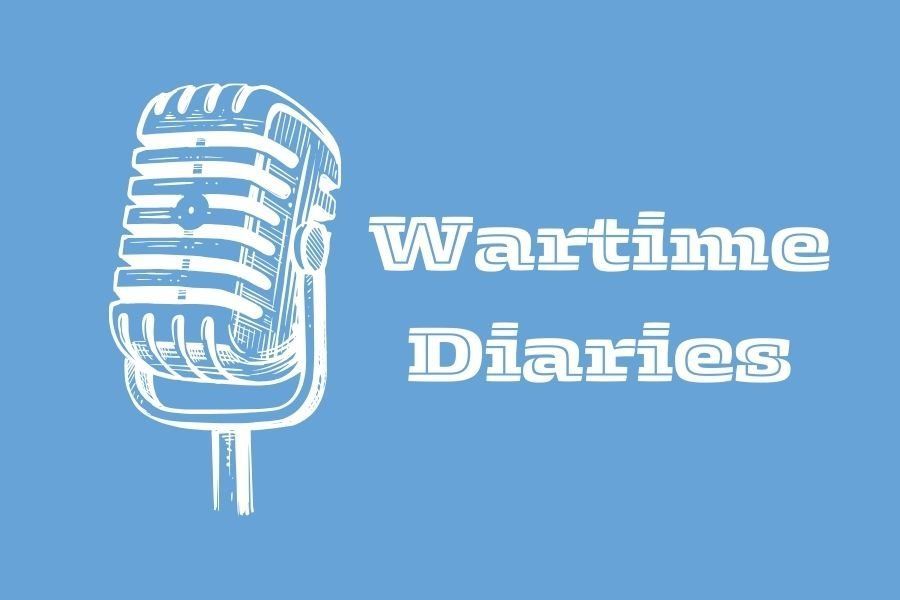“Mixtape” Part IV – War, Peace and Bumper Stickers
- 43:42
- 2018

Over the last four episodes, we’ve told the stories behind some of Israel’s most iconic songs. When we set off on this musical journey, we hoped to find a unicorn, a unifying island of Israeliness that escapes the usual polarization which dominates most conversations about Israel. Instead, however, we discovered that music not only reflects, but often amplifies, our contrasts. We all sing in different keys, with different words and in different voices. And that, at the end of the day, is what Israel is all about. It is not that the inherent complications go away or stop existing. It’s just that somehow, miraculously perhaps, the cacophony can almost sound harmonious.
In today’s episode, the final installment of the Mixtape miniseries, we turn to Yitzhak Rabin’s 1995 assassination, and to two songs – one taking us decades back, the other catapulting us forward into the 21st century – that symbolize the messy multifariousness of Israeli society.
Act I: A Song for Peace
When it first came out, in the middle of the War of Attrition, Shir La’Shalom was an anti-war hymn sung, paradoxically, by a military band. Meant to be an Israeli version of Hair’s ‘Let the Sunshine In,’ it was quickly banned by generals and labeled as both defeatist and demoralizing. But a quarter-of-a-century later, it resurfaced in what would turn out to be one of the most fateful nights the country has ever known. Hannah Barg tells the story of a song, a dream, and a musical reincarnation. This piece was written, recorded and produced together with Maya Kosover and Yochai Maital.
Act TranscriptHannah Barg (narration): Just like Meir Ariel, Yanka’le Rotblit – an International Relations student at the Hebrew University – was called up to the Six Day War as a reservist. But unlike Meir, he was severely wounded while leading his platoon of paratroopers through Abu Tor, in Jerusalem. Yanka’le lost a leg, but somehow managed to keep his joyfulness. Recuperating after the war, he became convinced that – despite the military triumph, despite the fact that Israel had tripled its size in less than a week of fighting – what the country now needed most was… peace. So he sat down and he wrote a song. A Song for Peace. The lyrics made their way to the most prolific Israeli song composer of the day – Yair Rosenblum – who was living in London at the time. And Rosenblum? His head was elsewhere. He had just seen an exciting new show that opened on the West End – a hippie counterculture musical called ‘Hair.’ Looking over the text, Yair immediately realized that Yankale’s song could be his opportunity to create a Hebrew version of ‘Let the Sunshine In.’ He got to work, composed it, and sent it off to Lehakat Ha’Nachal, the band of the Nachal Brigade, which was the hottest of all military bands. The Beatles of the IDF, if you want. Miri Aloni, the band’s lead singer then, remembers hearing it for the first time.
Miri Aloni: We fell in love right away with the song.
Hannah Barg (narration): The band members loved its edgy vibe, and were moved by the hopeful words penned by a man who had just lost a leg in the war. They began rehearsing and slated Shir La’shalom, that’s what the song was called, to become the centerpiece of their next big roadshow. The days were the days of the ongoing War of Attrition, and while the army was bolstering its fortifications along the Suez Canal, Miri and her bandmates traveled up and down the new Egyptian border in armored vehicles packed with musical instruments.
Miri Aloni: Through the days we were performing like three and four times in the outpost, and above us were shooting and bombing and everything. And we were there between the beds of the soldiers under the ground and we singing with unplugged guitars the whole night. It was a lot of fun, it was a lot of fun.
Hannah Barg (narration): Shir La’shalom, ‘A Song for Peace,’ was an immediate favorite among the troops.
Miri Aloni: The soldiers loved it so much.
Hannah Barg (narration): But not everyone was as enthusiastic. One of the main naysayers was the legendary IDF general Rehavam Zeevi, ironcly nicknamed ‘Gandhi.’ Gandhi was a hawk, a fearless fighter, who – during that very same period – was busy leading daring mirdafim, chases, after Jordanian and Palestinian terrorists. Here’s Eitan Haber, who was then an up-and-coming journalist, and a good friend of the general’s.
Eitan Haber: I was very close to Gandhi, the Head of the Central Command. And he didn’t like this song. He thought it was defeatist.
Hannah Barg (narration): Lines like “lift up your eyes with hope, rather than through the rifle’s sights,” were troubling to army higher-ups, who naturally thought that soldiers should keep their eyes on the target. And even worse was singing ‘al tabitu le’achor, hanichu laholchim’ – ‘don’t look back, leave the fallen behind.’ For an army that had just buried hundreds of its boys, it seemed demoralizing, and just plain insensitive. There were those who wanted to ban the tune altogether. It quickly became a matter of public debate. The younger generation, by and large, liked the song.
Eitan Haber: I told Gandhi what I thought – that the song was outstanding, incredible. And that it captured what many Israelis were thinking at the time.
Hannah Barg (narration): But the old guard wasn’t convinced. Shir La’Shalom was even discussed by a Knesset subcommittee, no less, that ultimately decided to let the band play. Yet not everyone in the military fell in line. On one evening in 1969 the Nachal Band’s van pulled up for a big performance at the Central Command. Everyone showed up, including – and this was somewhat nerve-wracking for Miri and her friends – one of the most vociferous objectors to the song. Yup, you guessed it. The revered general Gandhi. The Nachal Band gave a good show that night. But they left out their biggest hit.
Miri Aloni: We finished the program and then the soldiers of course they say ‘shir la’shalom,’ ‘shir la’shalom.’ ‘Song to Peace,’ ‘Song to Peace.’
Hannah Barg (narration): With Gandhi in the house, the band simply couldn’t play it. You see, he had personally issued an order stating that the song was not to be sung on any base under his command. And if there was one thing you didn’t want to do, it was to get on Gandhi’s bad side.
Miri Aloni: So we said to them, secretly, “when the colonel will go we will sing to you.”
Hannah Barg (narration): The crowd – hundreds of soldiers and officers – wouldn’t budge.
Miri Aloni: Nobody left the place.
Hannah Barg (narration): But Gandhi was no idiot.
Miri Aloni: He realized what is going on and he stayed there. They waited and he waited for half-an-hour and then they started to… to go and we didn’t sing the song at that night.
Hannah Barg (narration): There was no talking Gandhi out of it. Knesset decision or not, the song – he thought – had no place in the IDF.
Eitan Haber: Defeatism. That’s the word. That’s exactly what he thought.
Hannah Barg (narration): As you might imagine, the controversy just spurred greater popularity and the song became the talk of the nation: Op-eds were written for and against it, as Shir La’shalom climbed to the top of the charts.Surprisingly, perhaps, Defense Minister Moshe Dayan and Chief of Staff Haim Bar-Lev, were actually big fans of the song. And before too long Gandhi was put in place. He was, after all, part of a hierarchical system, and Bar-Lev rebuked him for over-reaching his authority. ‘A Song for Peace’ had won – at least temporarily. It would have its day in the sun, and then, like most hits I guess, it slowly petered out. That is, until November 4th, 1995. Twenty-five years after she had taken off her uniform, and stepped out of the military-band-limelight, Miri Aloni was brought out of semi-retirement. She was asked to sing her old hit at a peace rally in Tel Aviv in support of Rabin, Peres and their Oslo agreements. When she got on stage, in front of roughly 150,000 people, she got right into the old groove.
Miri Aloni: [Singing in Hebrew] Tnu la’shemesh la’alot.
Hannah Barg (narration): Except this time, there was a heightened sense of excitement and urgency. When the song was originally written – by a wounded soldier after a war – peace was a hypothetical ideal, a nice dream. But now, in the Kings of Israel Square in the center of Tel Aviv, flanked by Shimon Peres to her right and Yitzhak Rabin to her left, peace felt tangible. Israel had recently signed treaties with the Palestinians and with Jordan, and peace in the Middle East was, potentially at least, around the corner. Within reach.
Miri Aloni: It was like like a cloud of happiness went over the whole square, a pink cloud of happiness. To see so many people that coming to support the idea of Rabin that says that we must give the peace a chance.
Hannah Barg (narration): Eitan Haber, the young journalist who – in the late 60s – had tried to persuade Gandhi to accept Shir La’Shalom, was now Prime Minister Rabin’s Chief of Staff.
Eitan Haber: I couldn’t believe my eyes. The Square was packed, there was no room to move. And Miri got up to sing on the balcony and encouraged the entire audience to sing together with her. Everyone, except for Yitzhak Rabin.
Miri Aloni: When I stuck the microphone at the mouth of Yitzhak Rabin he was like “huhuhu,” because he was a very shy guy.
Eitan Haber: He really couldn’t carry a tune. He was humming along at best.
Miri Aloni: I remember that we when we finished the song we all laugh a big laughter because Yitzhak Rabin said, “I hope,” in his deep voice, “I hope that in the peace process we will hit the notes not like we did… like we did here.” [Sigh].
Hannah Barg (narration): A few minutes later, with the page with the words to ‘A Song for Peace’ neatly folded in his breast pocket, Rabin walked down the stairs of the municipal hall balcony and was about to get into his car. That’s where he was met by the three shots that would end his life.
At his funeral, in front presidents, kings, prime ministers and hundreds of millions of people watching around the world, Eitan Haber eulogized him.
Eitan Haber: After the doctors and nurses wept, they gave me the piece of paper they had found in your jacket pocket. I want to read a few words now from that paper but it’s hard. Your blood, Yitzhak, covers the printed words. Your blood on the paper of ‘A Song for Peace.’ This is the paper.
Hannah Barg (narration): Right then, Haber pulled out a plastic sheet protector. Inside it, clearly visible to all, was a white page with a big red stain in the center. He began reciting the barely visible printed words.
“Just sing a song for peace, don’t whisper a prayer. Just sing a song for peace, shout it out loud.” Yitzhak, we already miss you.
Act II: Can’t Afford the Luxury of Despair
On the day after Rabin’s assassination, author David Grossman was driving up to Jerusalem. On the side of the road he saw a religious settler standing next to his Volvo, peeling off bumper stickers with particularly provocative right-wing slogans. In his mind, David could trace a direct line, or chain, starting with inflammatory statements made by irresponsible politicians, continuing in the offices of creative copywriters who fashioned them into catchy phrases, on to drivers who adorned their cars with the stickers, and ending with a man with a revolver in his hand shooting the prime minister. His eight-year-long attempt to decode that chain led to one of Israel’s most popular rap songs of all time. Mishy Harman shows how bumper stickers can, in reality, stand in for the DNA of a nation.
Act TranscriptDavid Grossman: David Grossman is my name. I’m sixty-four, I was born in Israel. I’m married to Michal, we have three children. We lost Uri, our son, eleven years ago, in the war against Lebanon, and we have Yonatan and Ruti and two granddaughters.
Mishy Harman (narration): Last year, David won the Man Booker International Prize, and in April, on Yom Ha’Atzmaut, he was awarded the Israel Prize, the country’s highest honor. David is a man of words. He’s a prolific novelist and essayist, a leading advocate for peace and human rights, and he often publishes op-ed pieces that trigger fierce national debates. But we went to talk to him about something much less literary or highfalutin. We went to talk to him about bumper stickers.
David Grossman: Yeah, every car that I saw then, back then, had a bumper sticker. People felt the need to express their opinion. They felt the need to be critical towards almost everything that is not them. The bumper stickers competed with each other with their brutality and aggression and rudeness. I remember cars that I drove behind and I saw that half of the windshield is with very right-wing aggressive bumper sticker and on the left side of the windshield, there were very peaceful, hoping, and positive bumper stickers and you could easily say that this family is in trouble.
Mishy Harman (narration): Even David’s car had some bumper stickers.
David Grossman: Peace Now, and some bumper stickers who supported Yitzhak Rabin.
Mishy Harman (narration): On November 5th, 1995, the day after Rabin’s assassination, David was driving up to Jerusalem. Traffic was crazy, half the nation was making its way to the Knesset, where Rabin’s body lay in state.
David Grossman: And suddenly when I was stuck there in a traffic jam, I saw on the left a Volvo of settlers. And, of course, when I got closer and I saw the bumper stickers that covered almost all the back windshield, it was very right-wing and extremist, and even violent bumper stickers. And there stood a guy, the driver, with a screwdriver and he was peeling off the bumper stickers, and he peeled off the ‘Rabin a Murderer,’ ‘Rabin a Traitor,’ ‘Rabin Rozeach,’ ‘Rabin Boged.’ And then suddenly it occurred to me how strong and effective bumper stickers (that we all treated almost like a joke but) how effective they are in shaping public opinion after all.
Mishy Harman (narration): He looked at the man, carefully getting rid of the slogan he had so proudly flaunted till it all became a reality.
David Grossman: I think he got shocked by understanding what was his very little, very minor, share in this wave of violence and hatred towards Rabin at these days. And really, I think he felt remorse and shame. He didn’t want other people to see that he carried these cries out of Rabin is a murderer or a traitor.
Mishy Harman (narration): In his mind, David could trace a direct line, or chain – starting with inflammatory statements made by irresponsible politicians, continuing in the offices of creative copywriters who fashioned them into catchy phrases, on to drivers who adorned their cars with the stickers…
David Grossman: And in the end of this chain stands a person with a gun in and shoots the prime minister.
Mishy Harman (narration): David wanted to explore that chain, to decode the power of the bumper sticker.
David Grossman: So I started to collect bumper stickers.
Mishy Harman (narration): He did this for eight long years. It even became a family project, and all the Grossmans would jot down slogans they saw on the back of cars.
There were right-wing catchphrases and left-wing ones. Bumper stickers praising G-d and bumper stickers slamming religion. Slogans about veganism, the army, the supreme court, and – of course – the coming of the Messiah.
David Grossman: All of them are very very short and precise. And… I mean they are like a punch to your face. Maybe because we are tired of complexity, maybe because of that.
Mishy Harman (narration): But the hundreds and hundreds of slogans David collected told a different story. They showed just how complex Israeli society was. How we were fighting out our private wars in public, pulling the country in different directions, drifting farther and farther apart.
David Grossman: The Israeli spirit was encapsulated there.
Mishy Harman (narration): In 2003, he sat down with all those slogans.
David Grossman: And I took them, and I just wrote them, and put them on a table, and I looked at them and I thought, ‘what can I do with them?’
Mishy Harman (narration): David started reciting them out loud.
David Grossman: And I noticed immediately that when I read them, there is a special rhythm. And also that it’s very easy to rhyme them somehow.
Mishy Harman (narration): Before too long, a song or poem, made up entirely of bumper sticker slogans, started appearing in his notebook.
David Grossman: I wanted to give the energy of the contradictions and the inner animosity and, as you said, the complexity of the situation.
Mishy Harman (narration): When he was done, David called up Sha’anan Street, the leader of Israel’s most popular hip-hop band, Ha’dag Nachash.
Sha’anan Street: I remember, yeah.
Mishy Harman (narration): That’s him, Sha’anan Street.
Sha’anan Street: I’m a musician, member of Ha’dag Nachash, super band.
Mishy Harman (narration): So one day he received this phone call.
Sha’anan Street: It was afternoon, he called me he said, “hello, Sha’anan, this is David Grossman. I would like to meet with you.” He didn’t say what it was about.
Mishy Harman (narration): Sha’anan agreed and they met up in Jerusalem.
David Grossman: I just gave him the notebook with the bumper stickers that I wrote, in a pen I think it was still, and I said, “read, Sha’anan, read it.” And he read, and I started to see the smile on his face.
Sha’anan Street: Well, I knew it was ahhh… I knew it was genius. I knew that it was golden.
David Grossman: And then he took… he took it, and some weeks later he came and there was a song.
Mishy Harman (narration): The song became an immediate hit. Everyone identified something they could relate to. Right wingers liked it, left wingers liked it. Young people liked it, old people liked it. After all, it was a reflection of Israel, or – perhaps even more so – a reflection of the various different Israels.
Soon it was an international sensation.
Mishy Harman: But it’s like hard to sing along with this song.
Sha’anan Street: Not the chorus, they can do the chorus. [Sha’anan sings “kama ro’a efshar livlo’a”]. Everybody can do that.
Mishy Harman: But it’s hard because it has reishim, right?
Sha’anan Street: Well, they do [in an American accent] “kama ro’a” in America, and [in a Spanish accent] “kama ro’a” in Mexico, and, you know, [in a French accent] “kama ro’a” [Sha’anan laughs] in French Canada. But ah… [Sha’anan laughs] yeah. Whatever accent we embrace, no problem.
Mishy Harman (narration): Just before we said goodbye, I asked David to come up with his own bumper sticker, now, in 2018, as Israel celebrates its seventieth birthday. He thought about it silently for a few moments. He’s a man of words after all, and nowhere more than on a bumper sticker does each word count. Then, with more resolve than caution, he said…
David Grossman: Can’t afford despair. Can’t afford the luxury of despair. Maybe.
Mishy Harman: Do you think that would be a good bumper sticker?
David Grossman: No, no. No. [Mishy and David laugh].
Mishy Harman: If you were writing your own bumper car slogan now, what would it be?
Sha’anan Street: Shut the fuck up. That’s what I would put on the back of my car.
Mishy Harman: Why?
Sha’anan Street: There’s too much… Too much meaningless talk. Too much shouting. It’s about time we had some quiet.
Mishy Harman (narration): I told Sha’anan what David had said. Can’t afford the luxury of despair.
Sha’anan Street: It’s a great sentence. But he’s an author, I’m a rapper. So I would say “shut the fuck up.” [Sha’anan laughs].
Mishy Harman (narration): I guess it’s a combination of the optimist in me, the fact that shutting up would be a problem, since I basically talk for a living, and my general aversion to swearing on our show, but I prefer David’s version.
So in the spirit of his perhaps-less-than-sexy bumper sticker, let’s not despair. With all the complexities we saw throughout this miniseries – national ones, political ones, ethnic ones, and many other complexities we touched on in earlier episodes of the season and the show – with all that, you might wonder whether music actually is the unifying unicorn we set out to find. We all clearly sing in different keys, with different words and in different voices. But that, I guess, is what Israel is all about. It’s not that complications stop existing. It’s just that somehow, the cacophony can almost sound harmonious.
Credits
The original music in this episode – including the cover versions of Shir La’Shalom and Yihiye Tov – was composed, arranged and performed by the Mixtape Band, led by Ari Jacob and Dotan Moshanov, together with Ruth Danon, Eden Djamchid and Ronnie Wagner-Schmidt. The episode also features Shirat Ha’Sticker (‘The Sticker Song’) which was written by David Grossman and composed, sung and performed by Ha’Dag Nachash together with Ahuva Ozeri. The episode was recorded by Ben Wallick and mixed by Sela Waisblum. It is based on our latest live show, “Mixtape.” You can listen to Part I of the miniseries here, Part II here and Part III here.
Thanks to Shlomo Maital, Eli and Mira Kosover, Dalit Ofer,Hanoch Piven, Naomi Schneider, Mikey Ezrachi, Lior Zaberg, Yotam Michael Yogev, Sheila Lambert, Megan Whitman, Robin Mancoll, Annie Sandler, Ben Murane, Pamela Lavitt, Elaine Cohen, Eric Segal, Bar Sananes, Chrissy Rinehart, Yael Bermano, Valentina Khmenko, Rachel Schy and Rebekah Steinfeld.
Sponsors
 Jumpspeed Ventures is a unique venture capital fund that invests in Jerusalem’s technology ecosystem. They are the first and only venture capital fund dedicated exclusively to investing in the most exciting early-stage software startups based in Jerusalem.
Jumpspeed Ventures is a unique venture capital fund that invests in Jerusalem’s technology ecosystem. They are the first and only venture capital fund dedicated exclusively to investing in the most exciting early-stage software startups based in Jerusalem.

 Wartime Diaries
Wartime Diaries

